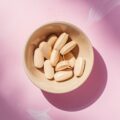Understanding Probiotics and Prebiotics
Probiotics and prebiotics are both important for gut health, but they work in different ways. Let’s explore what sets them apart.
What are Probiotics?
Probiotics are live microorganisms that provide health benefits when consumed. They help populate our gut with beneficial bacteria to keep things in balance. Common probiotic strains include:
- Lactobacillus
- Bifidobacterium
- Saccharomyces
You can find probiotics in supplement form or in fermented foods like yogurt, kefir, sauerkraut, and kimchi.
What are Prebiotics?
Prebiotics are non-digestible fibers that act as food for the good bacteria in the gut. Some common prebiotic foods include:
- Bananas
- Jerusalem artichoke
- Garlic
- Onions
- Apples
While probiotics introduce new bacteria, prebiotics help feed the existing beneficial bacteria in the gut microbiome.
Working Together
Probiotics and prebiotics work best together. Prebiotics provide nourishment for the new probiotic bacteria. Some foods like yogurt contain both probiotics and prebiotics for an extra gut health boost!
Should I Take Probiotic Supplements?
Probiotic supplements can be beneficial, but getting probiotics from fermented foods is best. Consider adding a supplement if you:
- Take antibiotics frequently
- Don’t eat a lot of probiotic foods
- Have digestive issues like bloating or constipation
- Want to support immunity and overall health
Talk to your doctor to find one that’s right for your needs.
FAQs
What foods have the most probiotics?
Yogurt, kefir, sauerkraut, kimchi, kombucha, some cheeses, and fermented pickles are among the top probiotic foods.
What’s the best source of prebiotics?
Bananas, onions, garlic, apples, Jerusalem artichokes, asparagus, oats, and flaxseeds offer great prebiotic fiber content.
Is it possible to have too many probiotics?
It’s generally rare if you get them from foods, but possible if taking very high-dose supplements for too long without medical guidance.
How often should I eat prebiotic foods?
Aim for at least 5-10 grams of prebiotic fiber daily from whole foods. Spread your intake out across meals.
How long does it take for probiotics to start working?
Research suggests most people notice benefits of probiotic foods/supplements within 1-2 weeks, but consistency is key for lasting effects.









